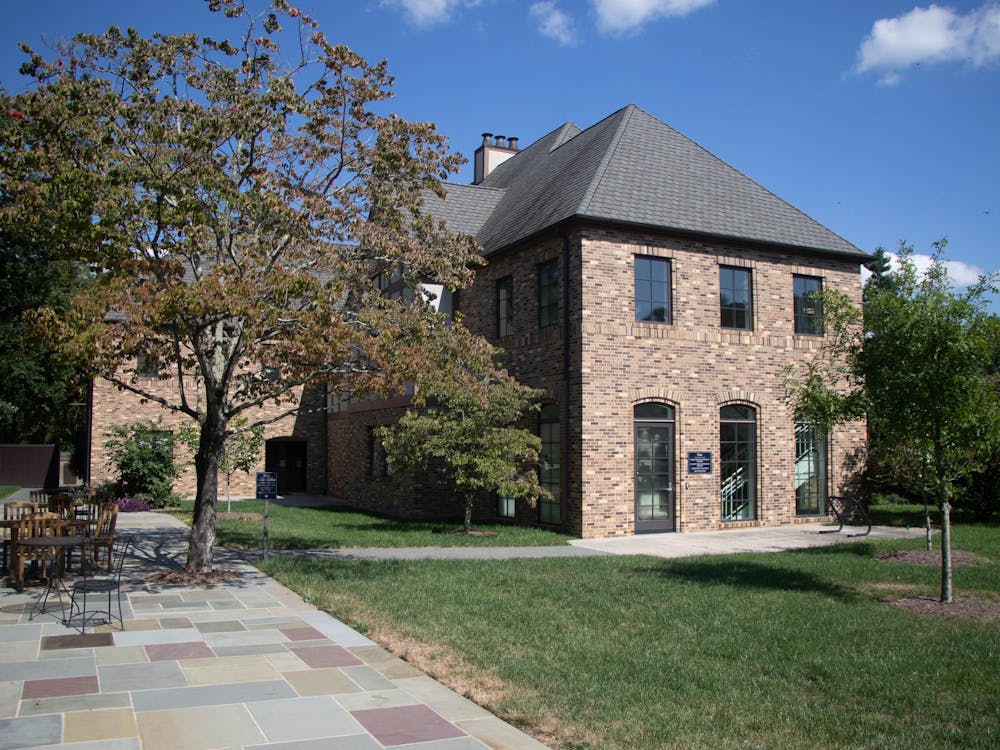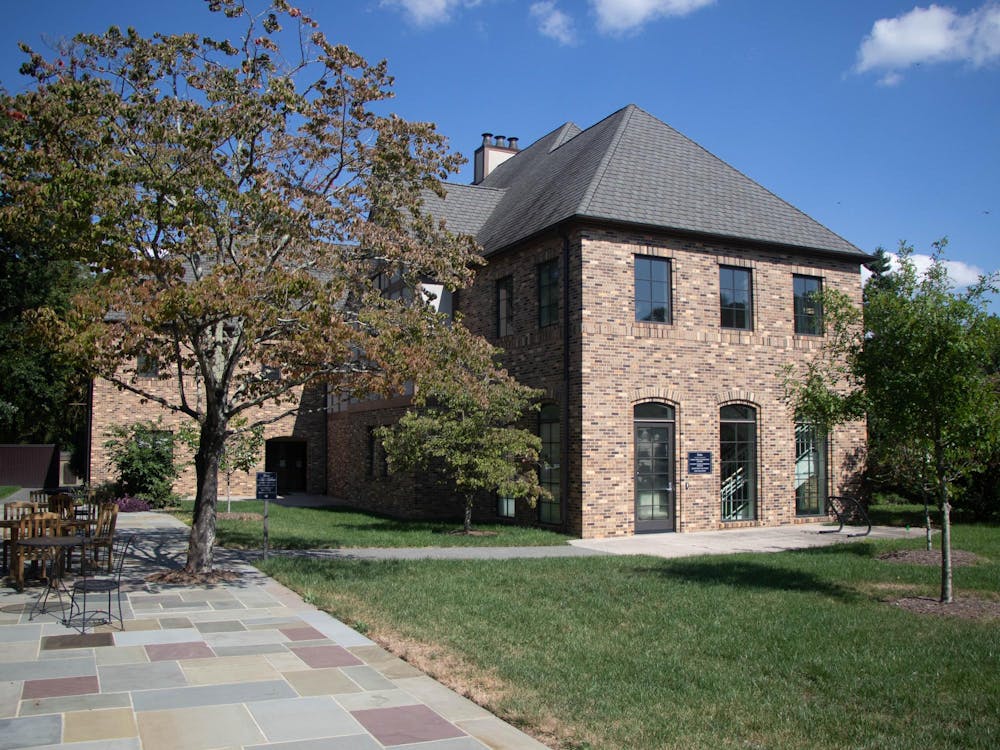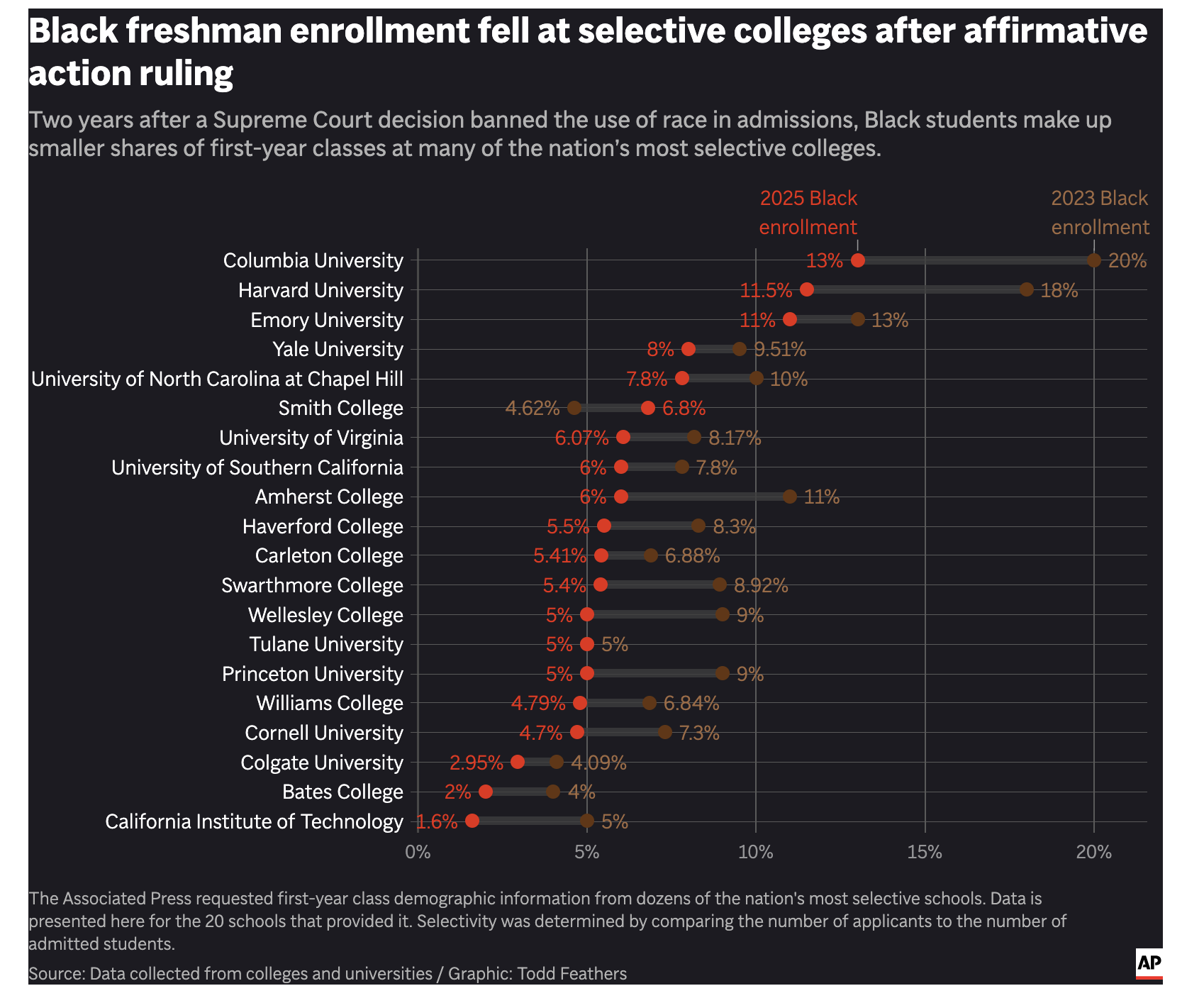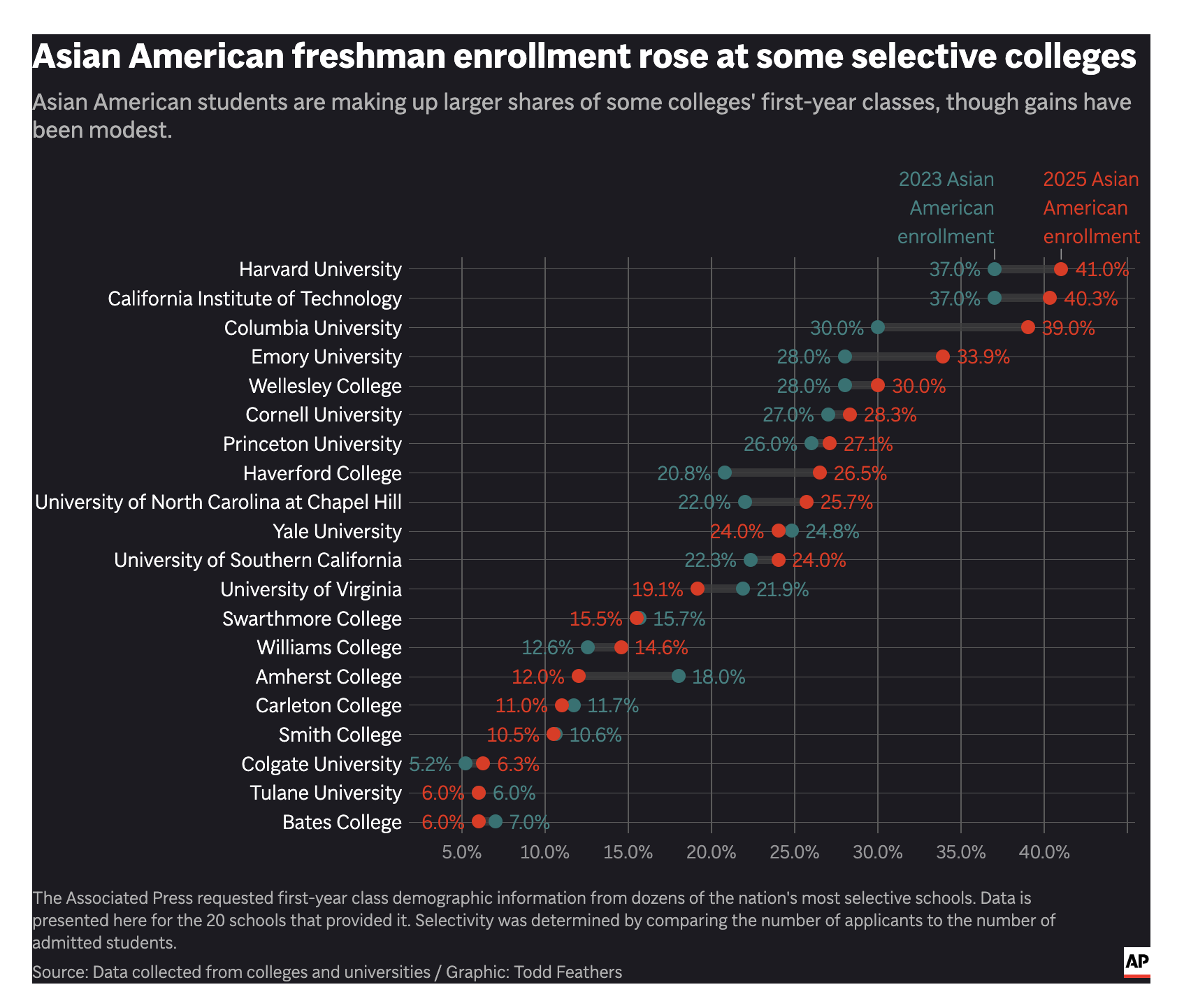An Associated Press analysis finds that the number of Black students enrolling at many elite colleges has dropped in the two years since the Supreme Court banned affirmative action in admissions.

apnews.com
Black enrollment is waning at many elite colleges after affirmative action ban, AP analysis finds
Christopher Quire poses for a portrait Thursday, Oct. 23, 2025, in Princeton, N.J. (AP Photo/Hannah Beier)
WASHINGTON (AP) — After decades of gradual growth, the number of Black students enrolling at many elite colleges has dropped in the two years since the Supreme Court banned affirmative action in admissions, leaving some campuses with Black populations as small as 2% of their freshman class, according to an Associated Press analysis.
New enrollment figures from 20 selective colleges provide mounting evidence of a backslide in Black enrollment. On almost all of the campuses, Black students account for a smaller share of new students this fall than in 2023. At Princeton and some others, the number of new Black students has fallen by nearly half in that span.
Princeton sophomore Christopher Quire said he was stunned when a recent welcome event for Black freshmen filled just half the room. Last year, it filled up so quickly that they needed to find extra chairs.
Christopher Quire poses for a portrait Thursday, Oct. 23, 2025, in Princeton, N.J. (AP Photo/Hannah Beier)
Christopher Quire poses for a portrait Thursday, Oct. 23, 2025, in Princeton, N.J. (AP Photo/Hannah Beier)
“If this trend continues, in three years this campus will be as Black as it was in the Civil Rights era,” said Quire, a member of the campus’ Black Student Union. “It feels like tying our feet together and telling us to restart.”
Some colleges downplayed trends spanning just two years, yet it raises questions about who should get a spot at elite campuses that open doors to the upper echelons of American life. It also emerges as the Trump administration unleashes a new campaign to police colleges it believes have quietly factored race into admissions decisions in defiance of the 2023 high court ruling.
Under scrutiny, colleges have been slower to release data
The AP analysis offers a view into 20 campuses that have released enrollment figures this fall. The national picture remains unclear as more colleges delay the release of their figures amid federal scrutiny. The AP requested data from dozens of the nation’s most selective colleges, but many that had released figures by this time last year declined to share them.
Many campuses have also seen decreases in Hispanic enrollment, though they have been more scattered and less pronounced. Trends among white and Asian American students were mixed.
Yet the erosion of Black enrollment has been clear.
Among the 20 campuses, just one — Smith College — had a larger percentage of Black students in this year’s freshman class than in 2023. Tulane University’s numbers stayed flat. The others saw sizable dips over two years, driving down Black enrollments that were often only 7% or 8% of the student body. By contrast, Black students account for about 14% of America’s high school graduates.
At the California Institute of Technology and Bates College, students who identified as Black accounted for only about 2% of freshmen this year.
At Harvard University, new figures released Thursday show a second straight year of waning Black enrollment, going from 18% of freshmen in 2023 to 11.5% this fall. Latino enrollment is also down at the Ivy League campus, while Asian American figures ticked up.
This year’s admissions decisions at Swarthmore College were made the same way they were last year, but fewer Black students applied and ultimately enrolled, said Alisa Giardinelli, a college spokesperson. She said the decrease “reflects the new legal landscape, one in which we expected to see these numbers fluctuate.”
Christopher Quire poses for a portrait Thursday, Oct. 23, 2025, in Princeton, N.J. (AP Photo/Hannah Beier)
Christopher Quire poses for a portrait Thursday, Oct. 23, 2025, in Princeton, N.J. (AP Photo/Hannah Beier)
Students notice dramatic changes
Princeton University appeared to weather the turmoil last year when its racial makeup remained about level. But this fall, the number of Black students fell to 5% of the new class, down from 9% last year. The last time Black students represented such a small share of new students was 1968, according to The Daily Princetonian, a student newspaper.
Princeton spokesperson Jennifer Morrill said it’s the result of natural fluctuations in the application pool, adding that Princeton has “scrupulously adhered” to the court’s requirements.
Some students say it can’t be ignored. Quire, the sophomore, said it threatens decades of progress at a campus that has become a stepping stone for social mobility.
“We’re very confused as to what changed and whether we should be expecting this to be a fluke,” Quire said.
Trump ramps up oversight of college admissions
Other factors could be contributing to the swings, said James Murphy, a director at the Education Reform Now think tank who is tracking fallout from the affirmative action ruling. The Biden administration’s troubled rollout of a new federal financial aid form could have played a role, he said, and some colleges may be backing away from diversity initiatives the Trump administration has sought to eliminate.
“Not too many institutions of higher education have stepped up and pushed back against the White House,” Murphy said. “I do expect that there will be increased pressure to come up with the numbers that the Trump administration wants.”
President Donald Trump escalated his scrutiny of college admissions in August, ordering schools to divulge vast troves of admissions data each year. It’s aimed at catching colleges that he accuses of using “racial proxies” to sway admissions decisions, including diversity statements that invite students to discuss their backgrounds.
Conservative organizations have also kept close watch. Last year, Students for Fair Admissions threatened to sue Princeton, Yale and Duke universities when their Asian American enrollments fell after the ruling — an outcome the organization said was “not possible under true race neutrality.” The group argued Black, Latino and white students were being admitted to elite colleges over more qualified Asian American students.
Kennedy Beal poses for a portrait Thursday, Oct. 23, 2025, in Princeton, N.J. (AP Photo/Hannah Beier)
Kennedy Beal poses for a portrait Thursday, Oct. 23, 2025, in Princeton, N.J. (AP Photo/Hannah Beier)
Some still see ways to build campus diversity
On average, the decreases don’t appear to be as steep as some college leaders predicted, said Richard Kahlenberg, a researcher at the Progressive Policy Institute. And he believes colleges can still do more to promote racial diversity, such as giving greater preference to students from lower-income families and eliminating legacy preferences that tend to benefit wealthy, white students.
“I wouldn’t want people to draw from the data a conclusion that the situation is hopeless,” he said.
Earlier this month, Princeton junior Kennedy Beal was walking across campus with her older brother, who was visiting, when he asked a question she couldn’t answer: “Where are all the Black men?” They had been wandering around campus for more than two hours and saw none.
Beal said it sends the message that Black students don’t belong there. With few Black students on campus to begin with, it feels like her sense of community is being stripped away, she said.
“It feels like we’re being set back in time a little bit, and it’s heartbreaking to see. But at the same time, I still have faith that we will persevere,” Beal said. “We will continue to demonstrate our excellence in these institutions.”
___
Associated Press writer Todd Feathers in New York contributed to this report.






